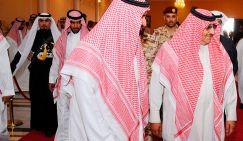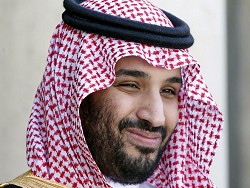
East – a delicate matter. Take the latest statement of the Minister of energy of Saudi Arabia Khalid al-falikha. In it, he, without batting an eye, stated that the Kingdom would not be ostensibly to increase their production up to maximum capacity and make the oil flood in the market. By the way, the level of oil production in the summer of 2016 has increased by 2.7% to 10.55 million barrels/day, while domestic consumption increased at the expense of 2 new refineries at Yanbu and Jubail, which have raised the demand for oil to 800 thousand barrels per day.
In other words, oil production is already at the limit and is unlikely Riyadh would be able greatly to increase it, while the propaganda campaign is very long and the Saudis are not only to retain part of the oil market, but also to increase its share. And that is why they will continue to strive to increase production “black gold”. Because oil is money and quite a lot, which the country sorely lacking every day on all of the rising costs and oil prices are rather prone to fall than to the restoration of 150 dollars per barrel.
As falling international oil prices, melting gold and currency reserves of the country. If in 2014 they exceeded 730 billion dollars to the current period, they amounted to 555 billion dollars. Although the stock of money is there, but the authorities are already talking about some reforms, and, above all, vaguely discusses some of the changes in the economy to reduce the country’s dependence on oil. At the same time taking steps to reduce budget expenditures. But such a policy step by step destroys the familiar to the Saudis stable peace and a normal way of life that has existed for the last 70 years. Political analysts believe that a counterbalance to all this will be the real capacity of oil production, which Saudi Arabia wants or does not want, but will still be will spend.
For example, disturbing news from Saudi Arabia has already sounded: in the first quarter of this year, the economy grew by only 1.5% compared to the previous year, which was the lowest growth rate since 2013. Moreover, if the oil sector increased by 5.1%, while other sectors decreased by 0.7%. Economists recognize that this is the weakest performance over the last five years. For example, in July the volume of production in construction sector decreased by 1.9% compared to the same period last year, and this trend continues to grow. Also had a negative impact on financial performance continuous fluctuations in the oil market and outflows of foreign money from the state. All of these factors, as analysts expect, will lead to the first for nearly eight years of decline in the Saudi economy.
The Saudi government was forced to announce plans to sell shares of Saudi Aramco. It is well known that the world’s largest oil company for decades was the basis of stability and wealth in the country. Initial public offering (IPO) of its shares, selling them will inevitably cause unrest and talk about the fact that the government has betrayed Islam and want to pass wealth to Western countries. Inevitably, under the influence deterioration of the situation in the economy, including religious tourism, will rise a new wave of protests with unknown political outcome.
Another way for the authorities, according to experts, devaluation of the national currency, which is also unlikely to appeal to Saudis. Meanwhile, in late October, Saudi Arabia will hold its first issuance of international bonds, which was expected, will allow to attract about $10 billion to cover the budget deficit. According to Bloomberg, coordinators of this issue will be banks JP Morgan Chase, HSBC and Citigroup.
While the government expects to reduce the budget deficit from 16.3% of GDP (the result of 2015) to 13.5% of GDP. Spending cuts and reduction of subsidies will continue and could increase in 2017, the society will encourage a more active market behavior, depriving easy money. For example, in the public sector there has been a sharp decline in vacancies, which was all about the Saudis. Revised plans for the construction of some roads in remote areas has also reduced the pace of construction of free housing for Saudis, especially for young people who married, were counting on the free municipal flats and houses.
It came to the point that thousands of foreign workers have become hostages of the financial crisis due to the fall in oil prices. Migrants worked on construction sites; they go months without a paycheck, they have nothing to return home. In towns lacking water and food. In Riyadh willing to pay migrants the way home. But some fear that they next time you are denied a visa, and most don’t want to go without earning for them and left behind families that money is vital. In a quandary was the citizens of many Asian countries — the majority from India, Pakistan and the Philippines.
All these problems arose immediately, but are accumulated as very unprofessional management of the country: personally, the king and the ruling family of Saud. First, having accumulated a huge amount of petrodollars, the Saudis have decided that they have the right to interfere in the Affairs of other countries and to tell other peoples how to live and what kind of system to have. In this regard, very significant is unprovoked rude intervention of Riyadh in the internal Affairs of the Syrian Republic. The Saudis decided to change the secular regime and President Bashar al-Assad and put their creature, completely focused on Riyadh and advocate the ideas of Wahhabism. Not accidentally, the Microsoft search engine translated the name of the extremist organization “DAISH” from Arabic to English as “Saudi Arabia.” When that didn’t work the first time, the Saudis have resorted to the outbreak of civil war in Syria, first by creating a terrorist group, and then liberally supplying them with modern American weapons. All this required huge sums of money that are easy going, when the price of oil was high. But then the money were taken directly from the state budget.
First step is the hardest. Then Saudi Arabia intervened brazenly in the civil war in neighbouring, according to the Saudis themselves, “brotherly Yemen.” Spring 2015 CSA is headed by a broad coalition, which was not just a “force” of Yemenis to the world, but to restore the power of “legitimate acting” President Abd rabbu Mansour Hadi, and most importantly — to stop the expansion of Iran.” And from the beginning of Riyadh, said that the movement of the so-called Huthis fully supported and directed from Tehran, is the ardent enemy of Saudi Arabia.
The essence of the strategy was to by a “small victorious war” to achieve a new geopolitical status of regional power, able to lead a broad coalition of allies and to take responsibility for regional stability. The initiator of this course was the Deputy crown Prince, a young Minister of defence, Mohammad bin Salman al Saud, who is also the son of a king. Many Saudis believe that after the death of his father he come to power, pushing from the throne of the current crown Prince Muhammad bin Nayef al Saud.
But it is now clear that the strategy of the Minister of defense have failed: none of the goals are not achieved, the Saudi coalition is divided, its ranks left closest ally — the United Arab Emirates. Washington also has refused to help the Saudis, advising them to include “Pro-Iranian” of Huthis in the new Yemeni government, and thereby to separate them from Tehran. But Riyadh is — a complete defeat, and especially for the Minister of defense, whose shares on the throne has fallen sharply. And, in addition, the difficult economic situation in which Saudi Arabia is under the administration of king Salman bin Abdul-Aziz al Saud and his son Mohammad bin Salman al Saud, requires new approaches both in foreign and in domestic politics.
Despite difficult current economic realities of Saudi Arabia, its leadership decided on the diversification and profound structural transformation, and was based on the experience of a gradual retreat from state capitalism in the neighboring UAE. Of course, Riyadh will face a lot of challenges, but the selection leaves no doubt, and possible success should affect other countries with similar economic models.
One form of solution of economic problems was the development of mutual beneficial relations with other countries, including with Russia. In turn, Moscow attaches great importance to expanding multifaceted cooperation with Saudi Arabia. This was stated by Russian President Vladimir Putin during a meeting with Mohammad bin Salman al Saud on the sidelines of the G20 summit in the Chinese Hangzhou. The development dialogue is extremely important due to the fact that Russia and Saudi Arabia – the two largest oil producer in the world. That is why Russia is interested in maintaining an ongoing dialogue between the two countries.








